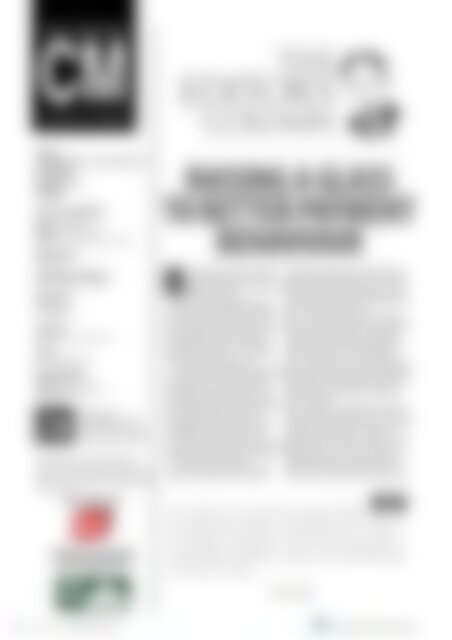201504 CM April
THE CICM JOURNAL FOR CONSUMER AND COMMERCIAL CREDIT PROFESSIONALS
THE CICM JOURNAL FOR CONSUMER AND COMMERCIAL CREDIT PROFESSIONALS
Create successful ePaper yourself
Turn your PDF publications into a flip-book with our unique Google optimized e-Paper software.
CREDIT MANAGEMENT<br />
<strong>CM</strong><br />
THE CI<strong>CM</strong> JOURNAL FOR CONSUMER AND<br />
COMMERCIAL CREDIT PROFESSIONALS<br />
Publisher<br />
Chartered Institute of Credit Management<br />
The Water Mill<br />
Station Road<br />
South Luffenham<br />
OAKHAM<br />
LE15 8NB<br />
Telephone: 01780 722900<br />
Fax: 01780 721333<br />
Email: editorial@cicm.com<br />
Website: www.cicm.com<br />
<strong>CM</strong>M: www.creditmanagement.org.uk<br />
Managing Editor<br />
Sean Feast<br />
Assistant Editor & Designer<br />
Andrew Morris 01780 722910<br />
Editorial Team<br />
Imogen Hart<br />
Iona Yadallee<br />
Alex Simmons<br />
Advertising<br />
Anthony Cave 0203 603 7934<br />
Printers<br />
Warners (Midlands) Plc<br />
2015 subscriptions<br />
UK: £85 per annum<br />
Overseas: £105 per annum<br />
Single copies: £10.00<br />
CREDIT MANAGEMENT<br />
<strong>CM</strong><br />
You’ll find it at<br />
www.cicm.com Just log<br />
on to the Members’ area,<br />
and click on the tab labelled<br />
“Credit Management online”.<br />
Reproduction in whole or part is forbidden without specific<br />
permission. Opinions expressed in this magazine do not,<br />
unless stated, reflect those of the Chartered Institute of Credit<br />
Management. The Editor reserves the right to abbreviate letters if<br />
necessary. The Institute is registered as a charity. The mark ‘Credit<br />
Management’ is a registered trade mark of the Chartered Institute<br />
of Credit Management.<br />
ISSN 0265-2099<br />
Audit Bureau of Circulations<br />
July 2012-September 2013:<br />
Average net circulation 7073<br />
the<br />
Editor’s<br />
column<br />
RAISING A GLASS<br />
TO BETTER PAYMENT<br />
BEHAVIOUR<br />
BIG companies are often criticised<br />
for the way they treat their smaller<br />
suppliers and they don’t come much<br />
bigger than Diageo.<br />
Last month, the drinks giant sent out<br />
a letter to its suppliers that set the alarms<br />
bell ringing. It implied that the firm was<br />
looking to move its payment terms from 60<br />
days to 90 days (from receipt of invoice),<br />
and appeared to justify the change by<br />
benchmarking its future model with the<br />
behaviour and culture of ‘… a number of<br />
industry and large organisations…’<br />
Perhaps not surprisingly, the letter was<br />
quickly leaked. Concerns were raised within<br />
the media, with a particular emphasis<br />
on Diageo’s status as a signatory to the<br />
Prompt Payment Code (PPC). The Code,<br />
administered on behalf of the Government<br />
by the Chartered Institute of Credit<br />
Management (CI<strong>CM</strong>), has been much in<br />
the spotlight of late. The Government,<br />
as reported in this magazine, has only<br />
recently announced a series of changes that<br />
enhance the Code’s enforcement powers,<br />
and this was its first major test.<br />
On being approached by the CI<strong>CM</strong><br />
Diageo, to its credit, quickly sought to<br />
clarify its position and its commitment to<br />
treating the supply chain fairly. It insisted<br />
that its standard supplier terms were not<br />
changing, and that no supplier would be<br />
required to move to longer payment terms<br />
to secure future business.<br />
The CI<strong>CM</strong>, for its part, later praised<br />
Diageo for clarifying its position, describing<br />
it as ‘a victory for Diageo, its suppliers,<br />
and all those that seek to create better<br />
behaviour, culture and understanding of<br />
payment issues.’ (see news page 9).<br />
Diageo’s actions may not be judged so<br />
benevolently, and with such understanding,<br />
by others. Indeed its people might yet be<br />
accused, perhaps unfairly, of executing<br />
something of a climb down. But does it<br />
really matter?<br />
Detractors of the PPC have tended to<br />
say that the Code lacks ‘teeth’. That it has<br />
‘failed’. Really? Despite it being a voluntary<br />
Code, Diageo thought it of sufficient<br />
importance to become a signatory, one of<br />
1800 firms who have so far come to the<br />
same decision. It has also subsequently<br />
defended its right to remain, and go on<br />
record to confirm its 60-day terms. That<br />
sounds like a Code that is working to me.<br />
The CI<strong>CM</strong>, for its part, later praised Diageo<br />
for clarifying its position, describing it as ‘a victory<br />
for Diageo, its suppliers, and all those that seek to<br />
create better behaviour, culture and understanding<br />
of payment issues ...<br />
<br />
4<br />
<strong>April</strong> 2015 www.cicm.com<br />
The recognised standard in credit management


















